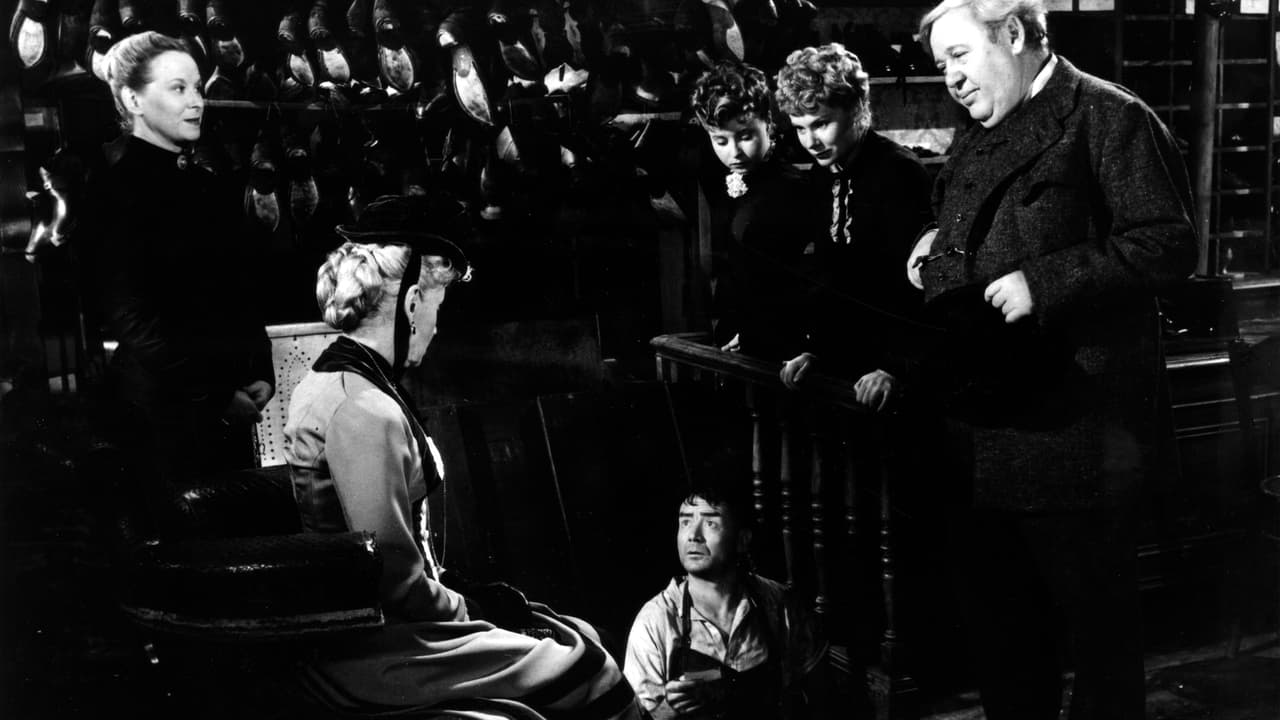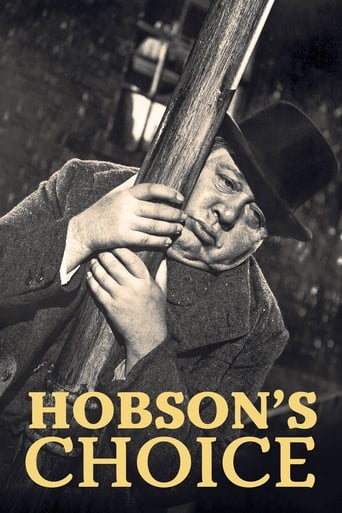

First watched this film one Sunday afternoon back in the early sixties and fell in love with it.Great story,great acting and directing by David Lean.I have lost count how many times I have watched it and I can still watch it again and again even to this day.
... View MoreThe story of daddy's little girl leaving the nest never gets old. If you like that classic theme, go out and rent Hobson's Choice. Charles Laughton plays the overbearing father of three daughters, all of whom are extremely anxious to marry and leave. Daphne Anderson is paired with Richard Wattis, Prunella Scales with Derek Blomfield, and Brenda De Banzie wins the prize with John Mills. But Papa Laughton isn't about to let them go without a fight, and in true British fashion-propriety at all costs and dry humor thrown in for the fun of it-the family battles it out.While it's very obvious the film was based off a play, it isn't overly wordy or boring like some plays are. Parts of it are pretty funny, if you like British humor, and it's always fun to see Charles Laughton transform for a role. Check out this family comedy and see if you like it!
... View MoreA delight of a film, and a reminder that David Lean excelled as much at small, intimate stories as he did sweeping epics.Charles Laughton plays a drunken widower who tries, without success, to dominate his three daughters. He's written off the oldest as a candidate for marriage, and takes for granted that she will assume the place of her mother in caring for him. But she has different plans, practically takes Laughton's wunderkind but timid employee (John Mills) hostage, tells him they're going to get married and sets up a shoe making business with him. Mills resists a little bit at first, but warms up to her and her plan and by the end has become the man she saw in him all along.Laughton, I regret to say, grows pretty tiresome before the movie is over. His stumbling drunken antics and rages aren't as funny as he and Lean think they are, and I sort of sighed inwardly whenever the story reverted to him. But the film more than makes up for what Laughton's story and character are lacking in the story of his daughter (played wonderfully by Barbara de Banzie) and Mills. The way their relationship evolves is a marvel of writing, directing and acting, and it's tremendously sweet. De Banzie somehow makes us love her battle axe of a character, and the character itself is a wonderful creation -- a woman who's strong in ways that matter and deeply kind, able to care for everyone in her life and draw out the best in them while the whole time making it look like she just wants to have her own way.A real treat.Grade: A
... View MoreThis seemed to get off to a disappointingly slow start. It's been lauded so often because of its director, David Lean, and the performances of its leads, especially Charles Laughton, that I expected a reckless comedy along the lines of Ealing Studio's. Well, it's not that. It's slow, yes, but it's charming too, and the story, which is an insane combination of Charles Dickens and Shakespeare's "Taming of the Shrew" and "King Lear", slowly engrosses a viewer because of its characterizations.Briefly, Laughton is an irascible boot maker in Salford, an industrial city near Manchester, a widower with three unmarried daughters. He considers the oldest daughter, Brenda Da Banzie, "too ripe" for marriage because she's thirty years old.She may be thirty but she's as sharp as a tack. While Laughton is the owner of the shop, Da Banzie runs the place. She brims over with business acumen. And when it becomes clear that the shop does so well with high-end clientèle primarily because of the skill of one of the boot makers, John Mills, she marries Mills, plucks him out of Laughton's cellar, and establishes him in his own shop. Laughton is a drunk who is finally forced to quit. The remaining two daughters marry upscale -- a lawyer and a wholesaler -- and become snooty. Result: Mills and Da Banzie move back into Laughton's now almost deserted shop and form a partnership with him. There's no question but that, with Mills' boot making skill and Da Banzie's business sense, they'll not only succeed but perhaps open another shop in the big city -- Manchester. The comically domineering Laughton is put out by his having to form a partnership but he saves his dignity by DEMANDING that the partnership be sealed on paper, which is of course what the others want -- and Laughton struts off down the street as if he were the Cardo and Decumanus of the whole boot making industry.Laughton's performance as a drunk and a blustering authority figure is as good as any he's given. John Mills progresses nicely from a pale, cellar-dwelling wimp with an unkempt bowl haircut, to a snazzily dressed tradesman, almost convinced that he's in command. Da Banzie does a professional job. Even the accents are accurate. ("Look" become "luke".)What stands out is David Lean's direction. I'm not saying it just because he made some movies that were great by any measure. He's has the eye of a master painter for composition, and it's demonstrated repeatedly in what must be one of the least attractive urban landscapes imaginable -- a northern industrial city in 1890 with cobblestone streets, smokestacks, veils of what we would now call smog, and rows and rows of shabby and depressing brick town houses. When Mills is courting Da Banzie (or the other way round), they sit on a bench beside the slowly flowing river full of sludge. "I've seen it when it was clear," Mills remarks.But Lean's direction, Jack Hildyard's photography, and the actors bring warmth and grace to this unpromising milieu.
... View More